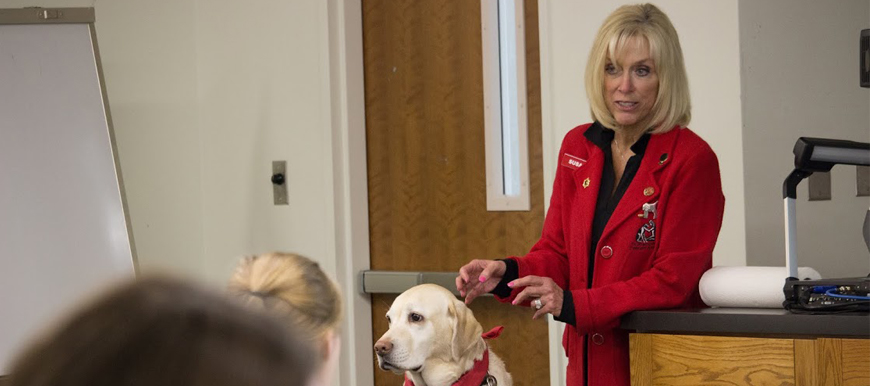Intermountain Therapy Animals visits USU
Interacting with animals can have health benefits, according to Intermountain Therapy Animals coordinator Kathy Klotz.
Klotz, who visited Utah State University to give a lecture titled “Not Just Warm and Fuzzy: The Proven Value of Including Animals in Therapeutic Regimens” in the Merrill-Cazier Library on Thursday, said she has seen the positive effects of including animals in her volunteer work.
Intermountain Therapy Animals is an organization of pet owners and their trained animals whose mission, according to Klotz, is “improving the quality of life though the human-animal bond.” Volunteers take their animals to help patients in hospitals and other healthcare institutions.
“A lot of what we see between our animals and our patients seems just like magic,” Klotz said. “But, as with most things, we can explain it with science.”
Klotz said studies have proven those who interact with animals have lower blood pressure, a slower heart rate and slower breathing than when they are not interacting with animals.
She said the medicinal benefits come mostly from the release of Oxytocin, an endorphin known as the “super bonding” hormone. She said the release of Oxytocin can increase trust, heal wounds faster and create connections. Human bodies release twice the amount of Oxytocin when they interact with animals than when they interact with humans.
Therapy animals also benefit people because they give them a “touch of nature,” Klotz said.
“No matter who you are, whatever culture you come from, no matter where in the world, people are drawn to images of nature,” she said. “It’s a great anti-depressant, ultimately. Whenever you spend time with another species, you are getting that touch of nature.”
Although Intermountain Therapy Animals don’t generally come to USU, students who are interested in therapy animals still have the opportunity to visit therapy dogs in the Counseling and Psychological Services office on the third floor of the Taggart Student Center.
There are two dogs in the office – Boris and Remy – and Eri Bentley, a staff psychologist and Remy’s owner, said they are usually there on Mondays and Fridays.
Bentley said therapy dogs enhance the quality of Counseling and Psychological Services because it makes students interested in the service.
“It introduces our service to students who may not know we exist or who may be hesitant to come to our door because of a stigma of mental illness,” Bentley said. “It’s a great outreach service.”
Luann Helms, a staff psychologist, said her dog Boris is helpful in therapy because he calms patients and helps them learn.
Klotz said therapy dogs are motivators for patient compliance.
“They literally help people forget pain and limitations,” Klotz said. “When you are met with something that draws your attention outwards, you can’t think about pain at the same time.”
The dogs who work with Counseling and Psychological Services were trained in a way similar to Intermountain Therapy Animals, according to Bentley. She said they have basic obedience training and have passed a Canine Good Citizen test.
In addition to training, therapy animals must have engaging personalities.
“It’s not about obedience skills,” Klotz said. “It’s about being able to engage with stranger after stranger after stranger and to respond to certain cues and participate with them in whatever they do. It’s a really hard job.”
If enough people express interest in training their pets to be therapy animals, Klotz said Intermountain Therapy Animals would be willing to start a class in Logan. For more information about Intermountain Therapy Animals visit http://www.therapyanimals.org.
— melmo12@gmail.com

